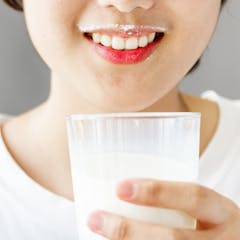
Articles on Dairy
Displaying 1 - 20 of 70 articles

Nigeria’s soft cheese, wara, could be made more widely available with new techniques to extend its shelf life.

It might seem like a simple concept, but to get ice cream right, you need three states of matter and a delicate interplay of chemistry.

Food prices are rising and around half of Australians are trying to cut back on their grocery bill. So how can you save on the cost of meat and dairy products without skimping on nutrients?

A recent evidence review found children who ate full-fat dairy were healthier and leaner.

Any benefit of eating ice cream can likely be explained by other factors – such as eating a healthy diet or exercising.

Tangible solutions would reduce livestock methane emissions, while also improving productivity and livelihoods.

Synthetic milk offers dairy milk without the concerns such as methane emissions or animal welfare. But is it the whey forward?

Listeria causes serious illness and food recalls nearly every year.

Foot and mouth disease hasn’t been on our doorstep since the 1980s. Keeping it out of Australia is a new national priority.

Climate change has a clear link to rising foodborne illnesses. Blackouts during heat waves and wildfires are a growing part of the problem.

New Zealand is accusing Canada of undercutting its commitments under the Comprehensive and Progressive Trans Pacific Partnership on dairy. Canada’s problem is that New Zealand’s case is strong.

Look out for products fortified with important vitamins and minerals.

People who don’t drink milk can choose other foods to get the calcium, protein, vitamins and minerals their bodies need.

UK supermarket chain Morrisons recently announced it will use ‘best before’ instead of ‘use by’ dates on its milks. This change makes sense for the environment, and from a food safety perspective too.

Technological changes on the horizon will likely disrupt the dairy industry as we know it — plans to mitigate the risks this transition poses to farmer livelihoods and animal welfare should start now.

Vegetables, fruits and legumes are nutritious and sustainable – but subsidies overwhelmingly neglect them.

Technological advancements in food production have created new ways to meet the growing demand for protein. Canada’s investment in this industry may create jobs and reduce carbon emissions.

In Canada, milk is available in jugs, cartons, bags and glass bottles. A new analysis reveals which type of container has the smallest environmental footprint — from container production to disposal.

African livestock keepers need help: without proactive interventions, increasing temperatures will reduce meat and milk production.

Diet - specifically veganism - and its impact on identity is becoming the focus of increasingly heated online discussions around climate change.

